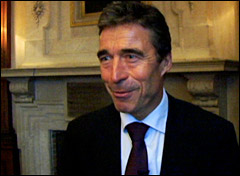Taking steps to combat global climate change can produce big economic benefits for countries, and it’s time for the United States to reengage in international talks for setting specific goals for carbon emissions cuts.
That’s the message Danish Prime Minister Anders Fogh Rasmussen brought to New York this week, part of his campaign to build momentum for negotiating a new climate treaty to replace the expiring Kyoto Protocol — talks currently scheduled to take place late next year in Copenhagen.
Rasmussen today appeared at the the Columbia University World Leaders Forum, where he stressed the point that addressing climate change can be an economic opportunity.
“The case for being proactive and turning the threat of climate change into a driver for sustainable economic development is a compelling one,” said Rasmussen. “My vision for a solution is of a new, low-carbon economy, a global economy which prospers in the pursuit of significant reductions of green house gas emissions.”
In his speech at Columbia, Rasmussen outlined what he would like to see come out of preliminary international climate talks scheduled to take place in Poland in December, and what should happen by the time leaders convene in Copenhagen in 2009. He said that in this year’s meeting, world leaders should commit to a goal of reducing emissions to 50 percent below 1990 levels by mid-century, and begin discussing intermediate goals.
“First of all, we have to decide on a long-term target for the reduction of greenhouse gas emissions, and in my opinion we should decide on a long-term target that ensures a 50 percent reduction in the emissions by 2050, compared to the level 1990,” Rasmussen told Grist in an interview following his speech. “On the basis of these long-term targets, we can negotiate all the details of a climate package, including intermediate targets as well.”
“It is essential to set ambitious targets for the reduction of greenhouse gas emissions, strengthening energy efficiency, for the development of renewable energy, because exact targets set a clear political course,” said Rasmussen. “To my mind that is crucial to make political and economic progress.”
Rasmussen also talked about the need to bring China and India along in a new climate deal. Political leaders in some developed countries (including President Bush) have objected to joining any pact that excludes China and India, as the Kyoto Protocol did. And leaders in the developing world have protested that since the already-industrialized nations had more than a century to pollute the atmosphere without paying a price for carbon, they too should have a period of unmitigated emission. Rasmussen emphasized that the benefits of action should be made clear to all parties.

“It is in their self-interest to mitigate climate change, and the industrialized countries could profit from being in the very forefront of low-carbon technology and a low-carbon economy,” said Rasmussen. “I think it is a big opportunity for all countries – developing countries, as well as developed.”
To ensure the participation of emerging economies, a new climate deal should include a “mechanism to facilitate the dissemination of green technologies,” he said. “If we are to ensure low-carbon, green growth in emerging economies, we have to give them a helping hand by providing them with new technologies, more climate-friendly technologies. The creation of a global mechanism to ensure a market-oriented dissemination of green technologies would be essential to make sure that they actually will participate in a global agreement.”
And since it will be the next presidential administration representing the United States in Copenhagen, Rasmussen stressed the importance of that new president taking up this issue very soon after taking office. “It is essential that whomever might be elected, they understand that we need to make firm decisions right from the beginning of 2009,” said Rasmussen. “We have established contacts with both campaigns … to make sure they are aware of the strict timetable.”
Rasmussen’s countrymen are aren’t waiting for an international consensus to emerge. Over the past 30 years, Denmark’s energy consumption has remained the same while the country’s gross domestic product has doubled (in the same period, U.S. emissions rose 40 percent). The average Dane uses roughly half the amount of electricity each year as the average American.
Denmark has established a goal of being a carbon-neutral country and committed to cutting emissions 30 percent but 2020. To do so, the country has dramatically increased its use of wind energy, which now contributes 20 percent of the country’s electric supply. And Vestas, a Danish company that designs, manufactures, and installs wind turbines, has become the largest wind turbine manufacturer in the world.
“The lesson learned in Denmark is that it is possible to combine economic growth with environmentally stable development,” Rasmussen told Grist.

